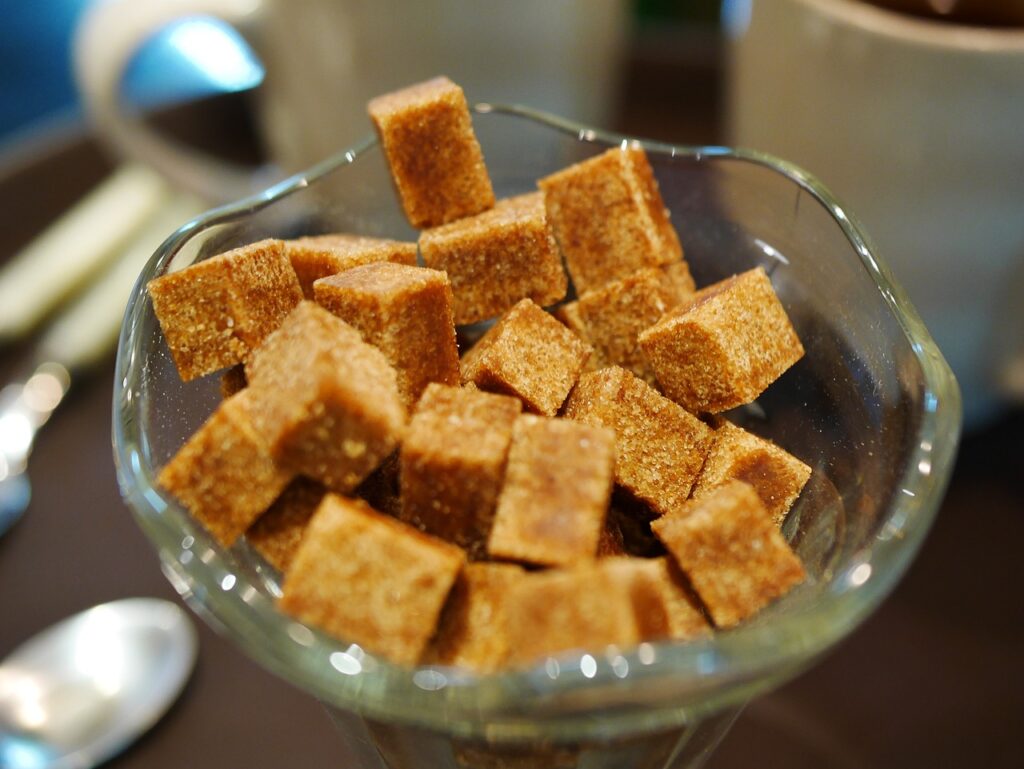Brown sugar, often hailed as a healthier alternative to refined white sugar, is a common ingredient in many kitchens around the world. This natural sweetener, known for its rich flavor and distinctive color, has sparked debates about its health benefits and potential drawbacks. In this comprehensive blog, we will delve into the question: Is brown sugar good for health? By examining its nutritional profile, potential benefits, and possible health concerns, we aim to provide a balanced perspective on whether brown sugar deserves its reputation as a healthier option. So, is brown sugar good for health or is it just another form of sugar with a different hue? Let’s explore in detail.

Is Brown Sugar Good for Health: All About Brown Sugar
Contents
ToggleWhat is Brown Sugar?
Brown sugar is essentially white sugar with added molasses, which gives it its characteristic color and flavor. The molasses content not only contributes to its darker hue but also provides trace amounts of minerals that are absent in refined white sugar. There are two main types of brown sugar: light brown sugar and dark brown sugar. The primary difference between them is the molasses content, with dark brown sugar containing a higher percentage of molasses.
Nutritional Profile of Brown Sugar
Understanding the nutritional content of brown sugar is crucial in assessing whether brown sugar is good for health. Here’s a breakdown of the key components:
- Calories and Carbohydrates: Brown sugar contains about 17 calories per teaspoon and approximately 4.5 grams of carbohydrates, similar to white sugar.
- Minerals: The molasses in brown sugar provides small amounts of minerals such as calcium, potassium, iron, and magnesium.
- Antioxidants: Molasses contains some antioxidants, which may offer additional health benefits.
While brown sugar does offer slightly more nutrients than white sugar, it is important to note that the differences are minimal.
Potential Health Benefits of Brown Sugar
1. Source of Essential Minerals
One of the arguments in favor of brown sugar is its mineral content. The presence of minerals like calcium, potassium, and iron can contribute to a small extent to the daily nutritional intake. However, the quantities are not significant enough to rely on brown sugar as a primary source of these nutrients.
2. Lower Glycemic Index
Brown sugar has a slightly lower glycemic index (GI) compared to white sugar. This means it may cause a slower rise in blood glucose levels, making it a marginally better option for those monitoring their blood sugar. However, the difference is minimal and should not be a primary reason for choosing brown sugar over other sweeteners.
3. Antioxidant Properties
The antioxidants present in molasses, and consequently in brown sugar, can help combat oxidative stress in the body. These antioxidants, while beneficial, are present in such small amounts that their impact may be negligible in the grand scheme of a balanced diet.
4. Better Flavor Profile
From a culinary perspective, brown sugar offers a richer and more complex flavor compared to white sugar. This can enhance the taste of baked goods and other recipes, potentially reducing the need for additional flavoring agents.
Potential Health Concerns of Brown Sugar
1. High Caloric Content
Despite its trace amounts of minerals and antioxidants, brown sugar is still a high-calorie food. Excessive consumption can contribute to weight gain and associated health issues such as obesity, type 2 diabetes, and cardiovascular diseases.
2. Impact on Dental Health
Like all forms of sugar, brown sugar can contribute to tooth decay. The bacteria in the mouth feed on sugar, producing acids that can erode tooth enamel and lead to cavities.
3. Blood Sugar Spikes
While brown sugar may have a slightly lower glycemic index than white sugar, it can still cause significant blood sugar spikes. This is particularly concerning for individuals with diabetes or those at risk of developing insulin resistance.
4. Minimal Nutritional Difference
The minimal difference in nutrient content between brown sugar and white sugar means that choosing brown sugar for its health benefits may not be justifiable. The additional minerals are present in such small quantities that they do not make a significant impact on overall health.
How to Incorporate Brown Sugar into a Healthy Diet
1. Use Sparingly
Given the potential health concerns associated with excessive sugar consumption, it is advisable to use brown sugar sparingly. Treat it as an occasional indulgence rather than a staple.
2. Balance with Other Nutrients
When using brown sugar, try to balance its intake with other nutrient-dense foods. Incorporate fruits, vegetables, whole grains, and lean proteins into your diet to ensure you are getting a wide range of essential nutrients.
3. Explore Alternatives
Consider exploring natural sweeteners such as honey, maple syrup, or stevia, which may offer additional health benefits. Each of these alternatives has its own nutritional profile and can be used in place of brown sugar in various recipes.
4. Monitor Portion Sizes
Pay attention to portion sizes when using brown sugar. Small quantities can add flavor without significantly impacting your caloric intake. Use measuring spoons to control the amount of sugar added to recipes.
In conclusion, the question “Is brown sugar good for health?” requires a nuanced answer. While brown sugar does offer slight nutritional advantages over white sugar, the differences are minimal. The presence of minerals and antioxidants, though beneficial, is not significant enough to make a substantial impact on overall health. Moreover, the high caloric content and potential health risks associated with excessive sugar consumption apply to brown sugar just as they do to white sugar.
Therefore, while brown sugar can be enjoyed as part of a balanced diet, it should not be relied upon as a health food. Moderation is key, and it is essential to consider the broader context of one’s diet and lifestyle when making decisions about sugar consumption. Ultimately, whether brown sugar is good for health depends on how it is used and the overall dietary patterns of the individual. By making informed choices and using brown sugar sparingly, you can enjoy its rich flavor without compromising your health.
Trendy Apps About Health And Food
If you are a health enthusiastic then you might wanna try some best trendy apps to help you with your food and health.
MyFitnessPal
MyFitnessPal is renowned for its comprehensive food database, which includes over 14 million foods. It makes food logging easy with features like barcode scanning and a robust breakdown of daily macronutrient intake. This app is ideal for those looking to track their food intake meticulously and gain insights into their nutritional habits.
Fooducate
Fooducate focuses on not just calorie counting but also the quality of calories consumed. It provides detailed nutritional information and assigns grades to foods based on their healthiness. The app also offers community support and educational tips on nutrition, making it a great choice for those who want to learn more about healthy eating and improve their dietary choices.
PlateJoy
PlateJoy offers personalized meal plans designed by nutritionists, catering to various dietary preferences and restrictions. The app generates shopping lists and can integrate with grocery delivery services. It’s especially beneficial for those with specific dietary needs, such as diabetics or individuals on low FODMAP plans, providing tailored meal plans that align with their health goals.
People Also Ask
1. Is brown sugar healthier than white sugar?
Brown sugar is often perceived as healthier than white sugar due to its higher mineral content. While brown sugar does contain small amounts of minerals like calcium, potassium, and iron, the differences are minimal. Both types of sugar have similar calorie and carbohydrate content, and the health impacts of consuming either in excess are comparable. Therefore, while brown sugar might offer a slight nutritional edge, the difference is not significant enough to consider it a healthier option overall.
2. Can brown sugar help in weight loss?
Brown sugar is not a weight loss aid. It is still a form of sugar, high in calories and carbohydrates, and can contribute to weight gain if consumed in excess. While it might be marginally better than white sugar due to its lower glycemic index, the difference is minor. For effective weight loss, it’s important to limit overall sugar intake and focus on a balanced diet rich in whole foods like fruits, vegetables, lean proteins, and whole grains.
3. Does brown sugar affect blood sugar levels?
Yes, brown sugar can affect blood sugar levels. Although it has a slightly lower glycemic index compared to white sugar, it can still cause significant blood sugar spikes. This is particularly important for individuals with diabetes or those at risk of developing insulin resistance. Moderation and careful monitoring of sugar intake are crucial for managing blood sugar levels effectively.






[…] […]
[…] Curd, also known as yogurt in many parts of the world, is a staple in many cuisines and is known for its numerous health benefits. The benefits of curd are extensive, ranging from improved digestion… Read More […]
[…] Curd, also known as yogurt in many parts of the world, is a staple in many cuisines and is known for its numerous health benefits. The benefits of curd are extensive, ranging from improved digestion… Read More […]